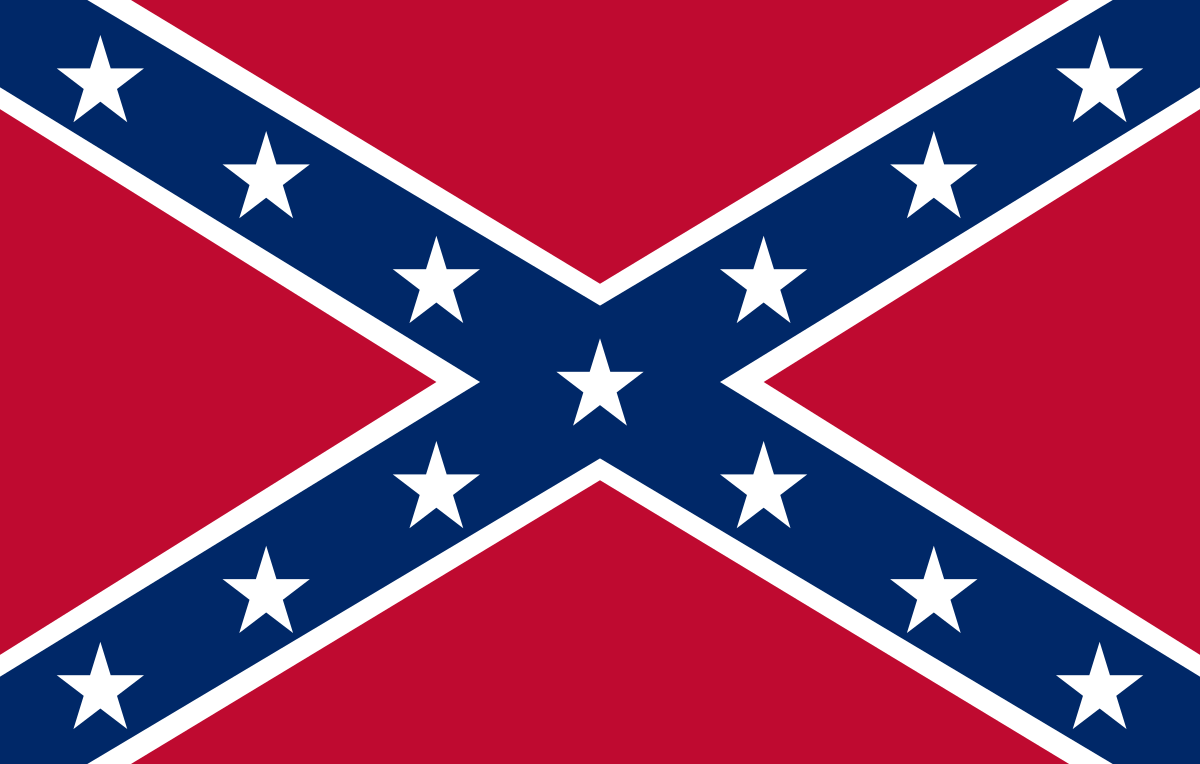The Confederate Battle Flag Belongs In a Museum
Posted on June 23, 2015

"Confederate Rebel Flag" by William Porcher Miles (1822-1899) (Vector graphics image by Crotalus horridus). This vector image was created with Inkscape. - SVG adapted from this image. Licensed under Public Domain via Wikimedia Commons.
It’s easy for me to say it.
I am from Illinois. I was taught, growing up, that Abe Lincoln was America’s greatest President and that the Civil War was a noble cause to keep the Union together and to rid the nation of the ugly stain of slavery.
So, for me, it’s a no-brainer. The Confederate Battle Flag belongs in a museum, not outside any State Capitol.
I am a history buff, so I actually think the Rebel flag is an interesting item for the museum.
The flag itself is visually attractive.
It’s criss-cross diagonal design was purposefully done to rid itself of any religious symbolism, which in many ways is completely appropriate. I guess it is ironic that a region of the country that sees itself as uber-faithful to Christ, would consciously make a flag that didn’t have a cross in it. But’s that’s exactly what happened in 1861, when the flag was first unveiled.
The first flag of the Confederacy was the Stars and Bars, which was dumped because it looked too much like the hated Union flag. That led to some confusion on the battle field, because when the wind wasn’t flowing, you really couldn’t tell the difference between the two.
It was Robert E. Lee’s Army of Northern Virginia which first used the more familiar Rebel Flag that now flies over the Capitol in South Carolina. When Walter Thompson designed the next version of the official flag of the Confederacy, he placed the Battle flag design on a field of White cloth.
He liked white cloth because he wanted everybody to know that the South was fighting for white power and white supremacy.
Unfortunately, for the Rebel army, that sea of white looked too much like a flag of surrender. And ultimately, the Confederacy would have to change the flag to make it less white.
That’s pretty much how it has worked out in the real world too.
The Rebel flag has always been a symbol of white purity and supremacy, but ultimately, the truth would set the region free. America is not a “white” nation, nor an “Aryan” nation, nor a “Protestant” nation. It’s a multi-ethnic, multi-race land of immigrants, people who are created equal pursuing their dreams.
Of course, it’s also an imperfect nation, ever-evolving, ever-improving, never quite going on a straight path, but always progressing.
Some people haven’t accepted the reality of life. They cling to a notion of racial purity, racial separation and racial supremacy.
This would become a thing, especially in the late 19th century.
Charles Darwin would publish his scientific treatise “On the Origin of Species”, which first theorized the theory of natural selection and the survival of the fittest.
Economists and other theorists would adapt Darwin’s observations of nature to human society. The result, Social Darwinism, would provide enough intellectual ammunition to justify racial purity laws in the south. It would also give Adolph Hitler scientific justification to develop his racial theories in Germany.
It is perhaps no surprise then that Hitler continues to inspire white supremacists in the South. Their theories of racial purity are inspired by the same 19th century philosophy.
Southern religious fundamentalists tend to reject Darwin’s theories of evolution. We are not descendants of the Apes, they insist. But at the same token, social Darwinism, or at least the ramifications of it, were accepted as fact in that same part of the country.
Charles Darwin was influenced by Thomas Malthus, the British cleric who predicted that population growth would lead to disaster, because people propagated faster than food. Malthus was a bitter critic of welfare because he believed that it made people lazy and worse, it delayed the inevitable catastrophic apocalypse that would lead to the demise of most poor people.
Malthusian ideas are easily found among folks who believe that we shouldn’t extend welfare, that we shouldn’t allow for more immigration, and that society will inevitably collapse disastrously.
White supremacy is based on racial theories that helped to inspire the Boers in South Africa, the Nazis in Germany, and the Ku Klux Klan in America.
It is a zero sum game. More for us. Less for them. The Bible is used as a justification for these theories, although they are a perversion of Christianity.
The Confederate Battle Flag is not primarily a symbol of Southern pride or Southern culture. It is a symbol of protest, a protest against modernity, a protest against progress, a protest against multiculturalism, a protest against the future. It is a also a symbol of white power and supremacy.
White racial theory might be based on scientific theories first proffered in the 19th century, but they have proven to be scientifically off-base.
From an economics perspective, it is not a zero sum game. Malthus was wrong. Economic growth grows the pie for everybody and feeds everybody better. Slavery, the Peculiar Institution as Kenneth Stampp put it, retarded the economy of the South, making everybody poorer, including the plantation owners.
From a biological perspective, racial purity laws make everybody dumber and crazier. When cousins marry cousins, genetically speaking, it leads to more disease and more insanity.
This a long way of saying that I am glad that Nikki Haley -- who is a prime example of how the South, and South Carolina in particular, is finally getting with the program – put an end to a long, national embarrassment.
The South will only rise again when it puts aside its troubling racial history and embraces a multi-cultural, pro-growth future that gives everybody a chance to live the American dream. Putting the Confederate Battle Flag in a museum is very good start.
